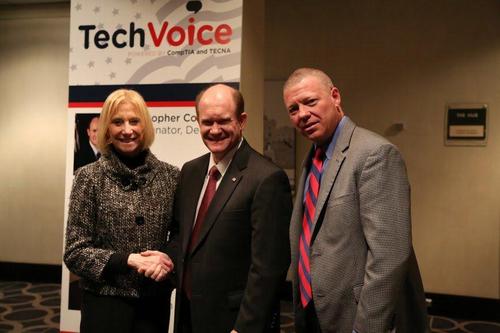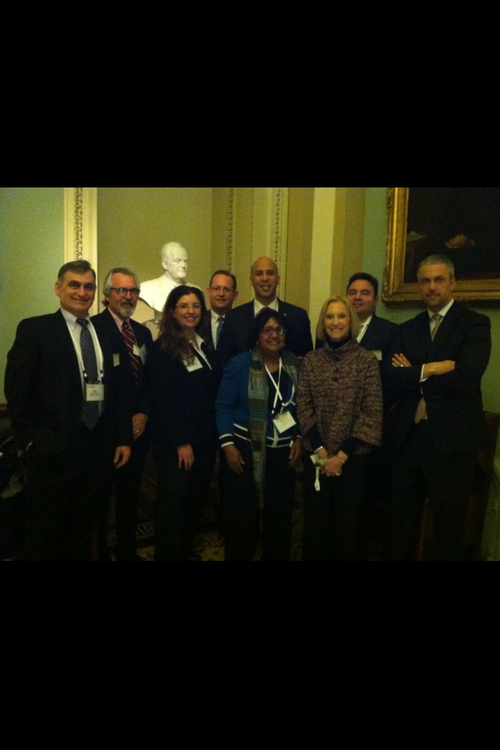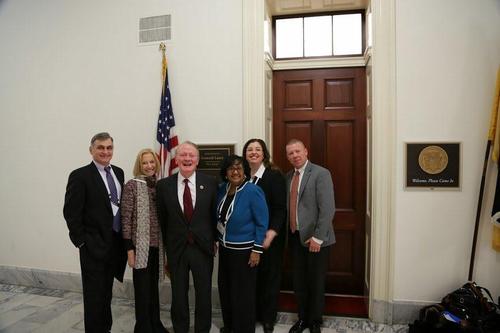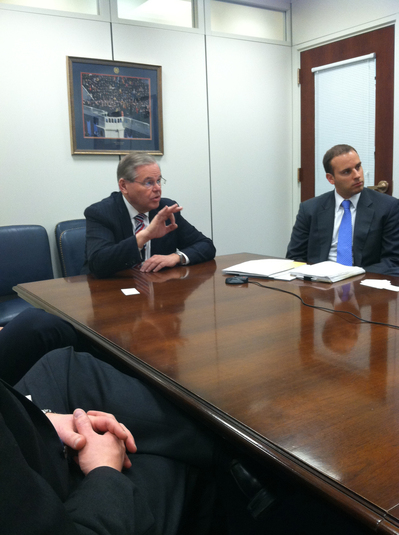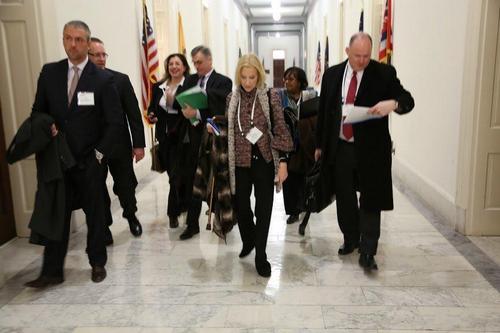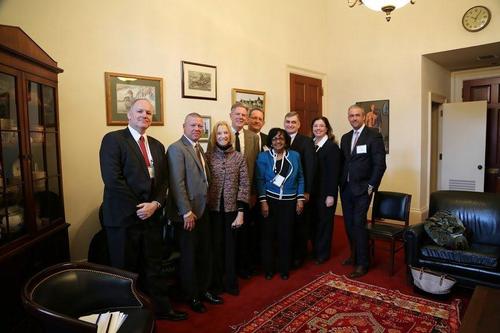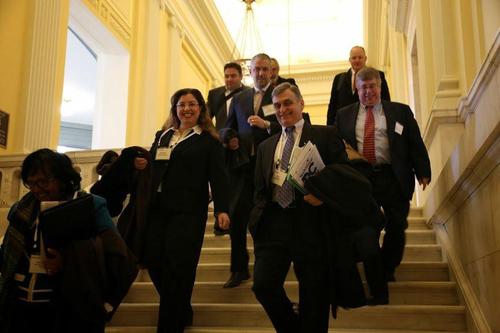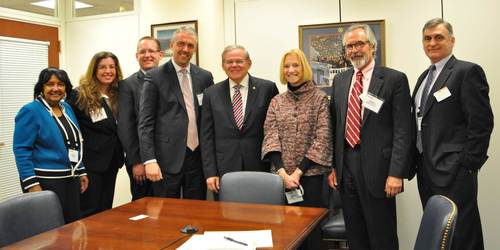As a member of the New Jersey Technology Council and an NJTC Ambassador, I participated in the TechVoice D.C. Fly-in held February 11 through 12 in Washington, D.C. on Capitol Hill. This Tech Policy Summit was sponsored by TechVoice, CompTIA and TECNA which brought together delegations from nation-wide State technology councils and organizations, technology industry business leaders, and academicians (the “Advocates”), as well as members of the U.S. Congress (House and Senate) and their staff to discuss various policies and legislation impacting today’s technology companies and our economy. The following are a few of the policy priorities and reform issues that were debated and discussed:
- Data Breach Notification Legislation. Currently, there is not a national standard for how a company must notify its customers regarding a data breach; instead, companies must navigate a web of 47 different and often conflicting state data breach notification laws. The Advocates championed policies that include setting a national standard for data breach and notification that would preempt the various state laws on these issues and provide appropriate exemptions for companies complying with other applicable laws on these issues or those that use encryptions or technologies that render data unusable, development of reasonableness standards, centralized government enforcement in connection with data breach issues, and passage of privacy legislation that balances the needs of small and medium-sized businesses to collect data to improve the customer experience while promoting consumer-friendly privacy and security policies. This year, the Data Security and Breach Notification Act was introduced by Senators Dianne Feinstein, Chairman of the Intelligence Committee; John Rockefeller, Chairman of the Committee on Commerce, Science and Transportation; Mark Pryor, Chairman of the Commerce Subcommittee on Communications, Technology, and the Internet; and Bill Nelson, Chairman of the Commerce Subcommittee on Science and Space. Developments on these issues will be watched closely by Epstein Becker Green which has both litigation and regulatory practice groups devoted to data breach issues: Data Breach/Cybersecurity Litigation and Privacy and Security Law.
- New/Emerging Technology Platforms and Patent Reform. Many new public policy considerations are raised by advancements in cloud computing, mobility, machine-to-machine (M2M), unified communications platforms and various internet-based applications. The Advocates supported release of a greater quantity, and larger blocks, of unlicensed wireless spectrum, nurturing of appropriate advancements in smart M2M technology, promotion of the responsible use and leveraging of big data to spur innovation and economic growth, support of limited, technology-neutral digital policies and education of policymakers on the need for best practices for mobility devices and applications. On a related note, the Advocates discussed several recent patent reform legislative proposals which have been championed by members of both the House and Senate and remain hopeful that the Senate will consider the Innovation Act (H.R. 3309) passed by the House last year (whereas the America Invents Act was passed in 2011 to address the quality of patents awarded, patent assertion entities (PAEs) or patent trolls continue to be a significant problem for small and medium-sized businesses and these issues must be addressed). Priorities of the Advocates include passage of patent reform to reduce abusive patent infringement litigation to curb costs and protect technology innovators, require various disclosures and more transparency concerning demand letters, and protections for end-users from abusive patent claims by allowing for the stay of cases against downstream customers. Developments with regard to new and emerging technologies and patent reform will be closely watched by attorneys across Epstein Becker Green’s practice areas (including health care and life sciences, labor and employment and corporate services), which are all well poised to assist businesses navigate these issues and their impact on communications systems, design of the workplace, and operation of health care delivery systems: Technology Team, Telehealth, and Product Marketing.
- Workforce, Educational, and Immigration Reform. According to the Burning Glass Technologies Labor Insights, there were up to 600,000+ open IT and IT-related jobs in the U.S. throughout 2013. Creation of a sustainable IT workforce was recognized as critical to U.S. global competitiveness. Further, recognizing that small and medium-sized IT firms account for over $100 billion in payroll and more than 2 million jobs, the Advocates championed policies on tax reform that would assist business growth (including enacting tax code benefits and credits that help the technology industry such as Section 179 small business expensing and the R&D tax credit for investments in technology research (which could allow small start-up firms and pass-through investors to offset the credit against payroll tax liability). However, as businesses continue to emerge and expand, it will be critical to attain the high-skilled workers to fill the growing demand for these jobs. The Advocates stressed the need for policies to expand life-long education in the computer sciences and IT skills to promote a skilled workforce to spur job growth and the ability of the U.S. to compete globally. In this vein, the Advocates stressed the need for improvement of the America Works Act, Workforce Investment Act and “No Child Left Behind”, support for science, technology, engineering and math (STEM) education in grades K-12 for college and post-secondary preparation and skilled-based certifications, legislative initiatives to encourage pursuit of IT career paths, funding for workforce training and certifications and high-skilled immigration reform (particularly as it relates to new visas for STEM graduates). Given that educational reforms will take years to have an impact, immediate immigration reform will also be needed to ensure that high-skilled workers can obtain visas to fill the current jobs, including those for foreign born but U.S. educated students and entrepreneurs. Several proposals in Congress must weigh border security, legalization, family and work visas and it is likely that immigration will be addressed piece-by-piece. Passage of workforce focused legislation that will help close the technology skills gap and drive students to STEM careers will be critical to U.S. growth and competitiveness. Moreover, as businesses compete for high-skilled talent in the technology sectors, it will become increasingly more critical to ensure that workplace policies and employee benefits are in effect to attract and retain these workers. Epstein Becker Green attorneys in our labor and employment, employee benefits, and immigration practices are well-versed in these issues: Executive Compensation, Non-Competes, Unfair Competition and Trade Secrets, and Immigration.
Following a briefing by various panels on these issues over the course of Day 1 of the Tech Policy Summit, the Advocates had opportunities on Day 2 to meet with their local representatives on Capitol Hill. Our New Jersey Technology Council delegation was led by Maxine Ballen (President and CEO of NJTC) and Paul Frank (Vice President, Membership of NJTC) who secured additional meetings with many New Jersey representatives to discuss the issues outlined above. I participated in our group meetings with Senator Cory Booker, Senator Robert Menendez, Congressman Frank Pallone, Congressman Leonard Lance, as well as staff for Congressman Donald Payne and Congressman Jon Runyan. The importance of these issues, as well as the impact on the future growth of technology businesses in New Jersey and across the nation, was recognized and heard. By the close of Day 2, it became increasingly clear that the issues we discussed at the Tech Policy Summit are critical to the future of our nation. As our world changes and new technologies and businesses emerge, we all must do our part to ensure that the future of our economy and our country continue to be well-poised for innovation. We need laws enacted to spur economic growth, create and protect jobs, protect our privacy and security, and improve our educational systems. Once enacted, implementation and compliance will also need to be addressed. I remain hopeful that businesses and the government can work together toward a common goal on these issues and that we will preserve for our citizens and future generations the right to life, liberty and the pursuit of happiness.
